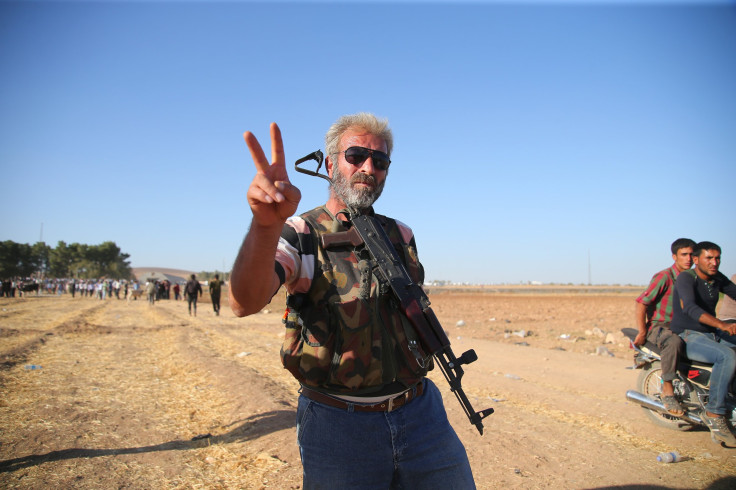Islamic State Crisis: Kurdish Forces Clash With ISIS Militants In Kobane, Near Turkey-Syria Border

Islamic State fighters were on the brink of entering the Kurdish Syrian city of Ayn al-Arab, also known as Kobane, on Friday. Militants engaged in heavy clashes with Kurdish troops from the People’s Protection Units (YPG) on the frontlines, and clashes were so close to the Turkish border that refugees already in Turkey reportedly could hear the fighting. Many Kurdish men returned to the frontlines after bringing their families to safety, Bloomberg Businessweek said.
Kurdish woman activist who comes to the border every day to look at #Kobane, checking if #PYD flag is still there. pic.twitter.com/pGdedTmFB5
— Constanze Letsch (@ConstanzeLetsch) September 25, 2014Militants with the group formerly known as the Islamic State of Iraq and Syria (ISIS) appeared confident in their ability to seize the town currently being defended by YPG fighters. After several hours of clashes, militant supporters and ISIS-affiliated social media accounts reported that the jihadists had captured Kobane. Some even claimed the militants renamed it Ayn al-Islam (Spring of Islam). International Business Times could not independently verify these claims.
Sources claim #ISIS has captured Ayn-al-Arab on the #Syria/#Turkey border and renamed the town to Ayn-al-Islam.
— ELIZA_CASS (@picus_tv) September 26, 2014" Islamic state officially renames kobane into ayn al islam,the town is now close to fall,radio station was seized,ypg slowly crumbling"
— Abu Anas (@siraajx) September 26, 2014Ismet Hesen, the YPG’s defense chief, told Bloomberg Businessweek earlier this week that ISIS militants “are planning to do in Kobane what they did in Sinjar.” Hesen was referring to mass executions of hundreds of Yazidi Kurds in Iraq earlier this summer in what the Obama administration referred to as a “humanitarian crisis.”
Hoping that the U.S. would come to their rescue as it did for the Yazidis, some Kurds on the border were hopeful U.S-led coalition airstrikes on ISIS strongholds would slow or even stop ISIS advances toward Kobane, the BBC reported. However, the airstrikes have hit ISIS strongholds in Raqqa and have largely targeted al Qaeda’s affiliates like Jabhat al-Nusra and the Khorasan group in the Aleppo governorate.
For the past week, ISIS captured dozens of Kurdish villages on the main road toward Kobane, forcing at least 140,000 people to flee across the Turkish border. Thousands more Syrian Kurds remain at the now-closed Turkish border. There they wait, hoping the Islamic State militants do not succeed in seizing the city. Social media reports on Friday showed some Kobane residents forcibly breaking down the Turkish border and walking into Turkey.
ISIS advances near the border put Turkey in a very difficult situation. If the militants do succeed in taking the town, the refugee total in Turkey could surpass 400,000, according to the United Nations.
What’s more, fighting so close to the border could force Turkey to defend itself. Since the U.S. announced it would expand its air campaign against the militants into Syria, the Turkish government has been very reluctant to detail what kind of support it might give to the international coalition against ISIS. As the only NATO member in the region, as well as a known entry point for foreign fighters going to Syria, Turkey wields a disproportionate amount of power when it comes to battling the militants.
The fate of Kobane and its thousands of Kurdish refugees was still unknown overnight Friday, but after nearly a week of clashes, Kurdish fighters said they remained determined to defend their land to the death.
“We will turn Kobane into Islamic State’s graveyard,” said Hesen.
© Copyright IBTimes 2024. All rights reserved.





















